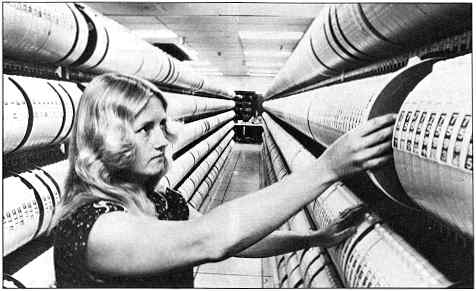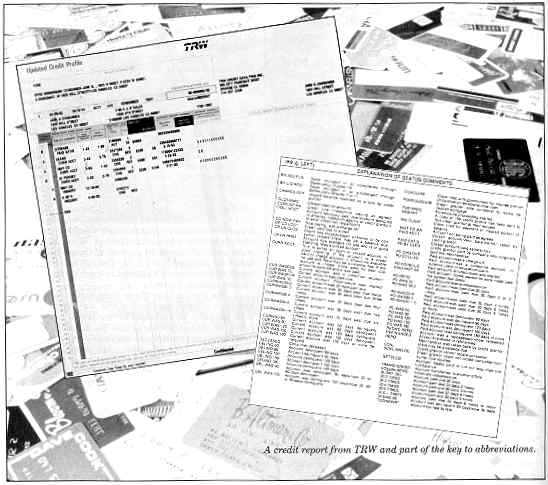KNOW
by Thomas Christo

Pulling your profile: credit records for millions of Americans are kept
on these computer tapes.
Thomas Christo is a trial lawyer, consultant and lecturer in the field of computer law. He has brought lawsuits against every major data processing vendor and has never lost a case.
Close encounters with record-keeping computer systems are responsible for a growing fear that there reside, somewhere, damaging and perhaps inaccurate electronic files on our credit history, our judicial and tax records, and yes, even our kinkier personal habits.
All too often our newspapers carry stories about computer victims: the Colorado widow, for instance, who failed to get a loan because a credit-reporting agency computer had mistakenly listed her as a tax delinquent, or the man on the West Coast who suddenly found himself in jail because he happened to fit a description supplied by a police computer. But if these stories have you worrying about what might be contained in your own computerized files, calm down. You don't have to let yourself be Big Brothered into submissive resignation to your fate.
Accessing Data
If you have even the slightest suspicion that something is awry, that some potential creditor or employer has done you wrong because of erroneous information, you have the right to take the offensive.
Under the Federal Freedom of Information Act, the Fair Credit Reporting Act and various state regulations, it's your privilege to know what source provided the troublesome data. Generally, when you are denied credit, the name and address of the reporting organization will be provided to you in a form letter. In the case of being denied employment, it's less likely that the source of information will automatically be provided; you'll probably have to ask for it by writing a formal request.
Once you get the name of the reporting agency that provided information to your prospective creditor or employer, write to that agency and demand a complete copy of your personal and/or credit file, together with a legend explaining all acronyms, abbreviations and codes. If it intimidates you to think of this information being stored somewhere in a monster computer, try to imagine instead a massive file cabinet containing, among other things, a report on you-of which you're requesting a copy.
What you'll typically receive is a computer printout with an abundance of codes and abbreviations, next to each of which is a numerical identifier. For example, there may be a code A-C, next to which appears the number 4. By looking at the accompanying legend, you determine that A-C means how fast a payer you are, as reported by various creditors, with 1 being a fast payer and 5 being a deadbeat. The number 4 should indicate that somewhere along the line a creditor has reported you to be a very slow-paying customer indeed. Rarely, you may even happen across an actual piece of narrative in plain English. Carefully review everything on your printout to determine what those computers are saying about you.
Challenging the Computer
Consider the West Coast man who was arrested, jailed and kept behind bars while the police decided whether or not he was the hired killer their computer files showed him to be. (It appears his name and identifying features were remarkably similar to the real murderer's.) After three days the police let him go with the warning: "Change your name." He decided not to, perhaps out of loyalty to his antecedents, and instead sued the county and police force that had arrested him for false imprisonment and slander and libel.
If a review of your computer files has turned up erroneous or incomplete information, you should immediately write to the reporting agency. Your letter should clearly spell out any inaccuracies and/or additional information to clarify what has been reported. Your first letter should be respectful but firm, and should include a request that the employer or creditor who received the erroneous/incomplete information be provided with an updated report (with a copy to you for verification). If you receive no response within two weeks, write a second letter raising the issues of slander and libel in the case of onerous information that is not financially related or of "slander of credit" if the information was financial in nature. The second letter should do the trick. If not, you may want to sue.
Banking on Accuracy
The right to challenge the computer's information and have it corrected extends to such areas as banking, billing and other everyday computerized records. "But the computer says . . ." should never be taken as an excuse: computers and their operators are clearly fallible, and this justification is often no more than an attempt at passing the buck. With computers proliferating in homes, there is now an interesting variation on the theme. When a home computer user on a pilot bank-at-home service in New York, for example, was sent a dunning letter because the bank's computer showed an outstanding credit card payment, the man was able to respond that his computer said he was up to date with his payments. The bank never bothered him again.
Incidentally, banking at home and electronic funds transfer (EFT), the process by which you can pay bills or transfer funds from your checking and/or savings account, provide examples of home computer applications that could invite trouble. The temptation will be great to rely on your keyboard and telephone line and on the processing of the bank's central computer, which would be like turning over all your worldly goods to some unknown third party and blindly accepting his word on what bills you've paid and how much money you have left. Thus it would be wise to keep some sort of manual backup (remember your old checkbook register?) to guard against technological thievery or negligence.
The most sensitive areas of our lives are being or will be touched by the computer, and the possibility increases that data will be misused. But the point is this: just because the computer says it's so, doesn't necessarily mean it's so.

A credit report from TRW and part of the key to abbreviations.
A large (242K) version of this image is here.
| MY FIRST JOB Falsifying computerized records was my first job out of college, though I wasn't aware of it at the time. Fresh out of school and not too eager to commit to a major career move, I drifted through the summer of 1969 intent on doing odd jobs. My first turned out to be odd indeed. I answered an ad in the New York Times for temporary help. When I called the telephone number and heard that the pay was nearly twice the minimum wage and evening hours were available, I was ready to sign up for the next shift. My employer turned out to be a major credit card company. After filling out a few standard personnel forms, I was led into a large clerical office where I was instructed in my appointed task. I was to take yellow billing forms and green-and-white computer printouts and do some creative bookkeeping. There were credit totals indicated for each cardholder and code numbers for where the money was spent, but no individual dollar amounts. It was the job of the dozens of us in the room to come up with fictitious subtotals in keeping with the kind of establishment in which the card had been used. Everything on the forms was numbers. I never knew the names of my victims, only their ID codes (eight digits) and where they spent their money (six digits). I would look,up the name of the establishment and its location on the partial computer printout and charge accordingly. I quickly came up with my own economic model of the United States, charging an appropriate price for a restaurant meal in Topeka and yet another for a motel room in El Paso. The job seemed nonsensical and tedious. After three weeks we were told that the work would soon be winding down but were offered a raise if we wanted to continue into the next phase of the project. I passed. It wasn't until several years later that I learned what we had been doing. At a cocktail party a former programmer for the credit card company told me about a massive computer error that had wiped out parts of records for over a million cardholders. When their bills were sent out, about 10 percent of these customers asked for itemized listings. My first job had been the result of the company's attempt to cover up its embarrassing computer error. The irony is that fifteen years earlier my father had been offered one-third of this very same credit card company in exchange for his travel agent's license. No money, just his license. He turned down the deal because he couldn't see any future in people using credit cards. After all, who could possibly entrust their financial transactions to something as flimsy as a piece of plastic and a computerized billing system? Oh yes, to this day I have never applied for a credit card. STEVEN ARCHER |
Return to Table of Contents | Previous Article | Next Article

